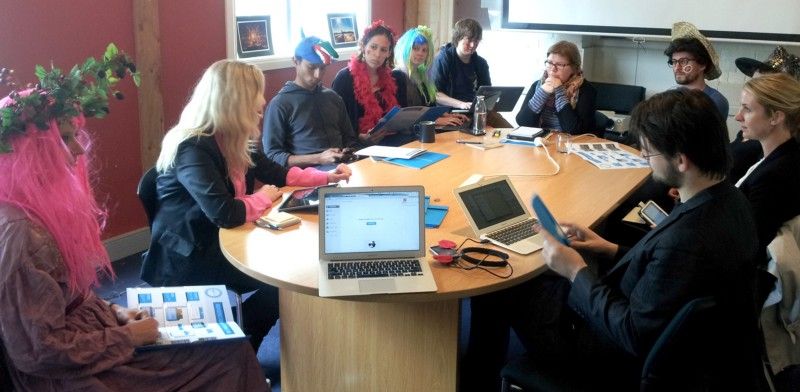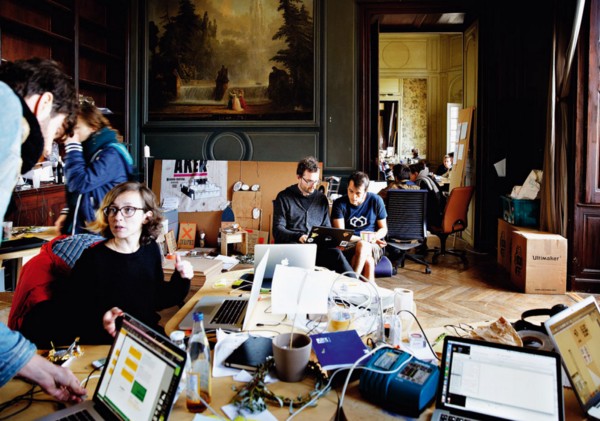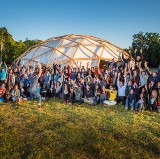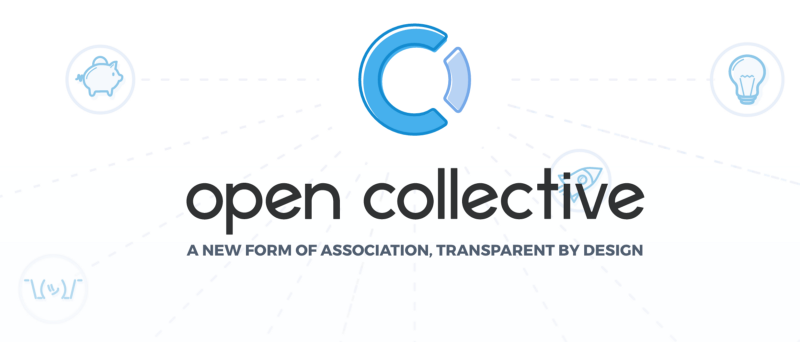Being a Circle in a World Made for Triangles
Alanna (Krause) Irving is working with Open Collective, gathering stories at the forefront of transparent community-driven financial power.

Alanna Irving is working with Open Collective, gathering stories at the forefront of transparent community-driven financial power.
Something funny happened on Halloween a few years back. I inadvertently brought two worlds together using the power of silly hats.
At that time, startups at Enspiral (an innovative collective of social entrepreneurs) were starting to grow up. It’s great to be a hacker, reinventing all the rules, but once money and contracts enter the picture you necessarily intersect with the legacy world of banks and lawyers.
Figuring we could all benefit from some good old fashioned training, I invited a local HR consultant to come give a workshop at the end of the month. I completely forgot it would be Halloween.
At the appointed time, a cheerful blonde woman in a suit turned up, expecting a conference room full of business people. But when she stepped through the door she saw a forest witch, a mermaid, and a cowboy. Her eyes widened and her smile froze on her face.

That was funny, but what came next was even more interesting. She asked us what HR questions we had:
“Sometimes we want to just gift money to each other, but our accountant says generosity between businesses isn’t in the tax code. What should we do?”
“How do you stop people from working too much for free? We’ve had some issues with people turning down payment and later burning out.”
“We don’t have job titles. Can I put ‘Director of Autonomy’ on my business card?”
Taking it like a champ, she kept smiling and replied: “Well, I don’t know. I’ve never been asked those questions before.”
In the end, it was great: we learned about employment law and regulations, and she ended up getting interested in making her own agency more flat. While superficially it was the contrast of costumes versus suits that stood out, on a deeper level two very different shapes were coming into contact.
For most of my career, I’ve been hacking company structures and financial processes to make working together in new ways possible. I believe a new paradigm is emerging, defined by peer production, networked organisations, frictionless transparent money flows, and the obsolescence of hierarchy.

Advancement in communications technology has opened up new ways of collaborating, but our social and legal technology hasn’t kept up. For now, we have to figure out how to create the future while operating within the old systems.
As a friend once described it, “Inside we’re shaped like circle, but sometimes we have to wear little points to act like the triangle that the world requires.”

It’s not easy being a circle in a world made for triangles.
The old systems are set up for proprietary, scarcity-driven, conflict-based, and command-and-control models. Those who want to work in open, cooperative ways face many practical challenges, especially when it comes to financial processes.
Creating and donning those little points can be expensive and time consuming. Sometimes the obstacles are so large that people give up and go back to the old way of doing things (which makes me sad).
That’s why I got excited when I learned about Open Collective.
There are many ways to describe Open Collective: like rolling crowdfunding with built-in transparency, or like an instant fiscal sponsor in a box. It’s for communities that aren’t shaped like a triangle, where it doesn’t make sense to start an LLC, open a bank account, and appoint directors. Open Collective instantly gives you a home on the web with a ‘donate’ button, where you can celebrate your supporters and be accountable to them, unlocking the amazing power of crowd-driven financial resourcing.
As someone who’s often taken admin and accounting responsibilities in circles trying to act like triangles, there are many times when Open Collective would have saved a lot of pain. One example is what happened with POC21.

POC21 was an eco-hacker innovation camp that took over a disused castle outside Paris for six weeks leading up to the COP21 climate talks. We wanted to go beyond talking and start building, prototyping not just open-source hardware solutions to reduce carbon emissions but also highly collaborative ways of living and working together.
As the innovation camp drew to a close, we wondered how to keep collaborating once we went our separate ways, and how to create opportunities for our enthusiastic wider community to support that. At the time, we didn’t know about Open Collective, so the best solution we could come up with was to set up a Patreon page to collect donations. We connected Cobudget to facilitate participatory spending decisions, and we were delighted when supporters pledged hundreds of dollars a month, and makers proposed a range of exciting projects.

Then we ran into a problem: we needed a bank account to put the crowdfunded money into and pay out expenses from, and a way to deal with accounting and taxes. As a true collective, distributed across countries with no one entity behind it, we had to scramble to find a fiscal sponsor.
These challenges turned a triumph of community-driven collaboration into an admin headache. Eventually we worked it out, but it used up energy that could have been going toward climate solutions instead. We never would have had these issues if we’d used Open Collective from the start.
Borrowing a metaphor from software, think of Open Collective as the ‘front end’ (where the users can input data, see information displayed, and interact with it), and the company and bank account as the ‘back end’, (where data, in this case money, is stored and moved around).
The ‘front end’ Open Collective application provides a simple way for collectives to manage donations and expenses, and share that information transparently. It’s designed to make financial admin easy. If you want to change something about it, you can fork the open source code and start hacking.
When it comes to the ‘back end’, as with many open source software products you can either pay to use the hosted version or choose to host it yourself. Open Collective offers a host that you can use for a small fee (essentially functioning as a fiscal sponsor), or you can ‘self-host’ and hook up your own legal entity and bank account. Whatever shape you need to be — a loose association, a nonprofit foundation, or a standard LLC — you can make the system work for you.

Open Collective’s long term goal is to build a network of hosts in different locations and legal jurisdictions, so all kinds of groups can focus on their mission instead of getting bogged down in legal questions. Each host can become a platform for a range of amazing collectives. (If you’re interested in becoming a host, the team wants to hear from you).
Addressing a real problem with an immediately useful tool like this can have transformative impact. By reducing the time and effort required to cooperate with money, to be a circle, Open Collective brings us one step closer to a new reality where the easiest and best way to do things is also the most transparent and collaborative.
Hands-on, practical examples of real people inspire me, so over the next few weeks, I’m going to be collecting and telling the stories of a range of Open Collectives. I’ll be sharing them here, so stay tuned!

